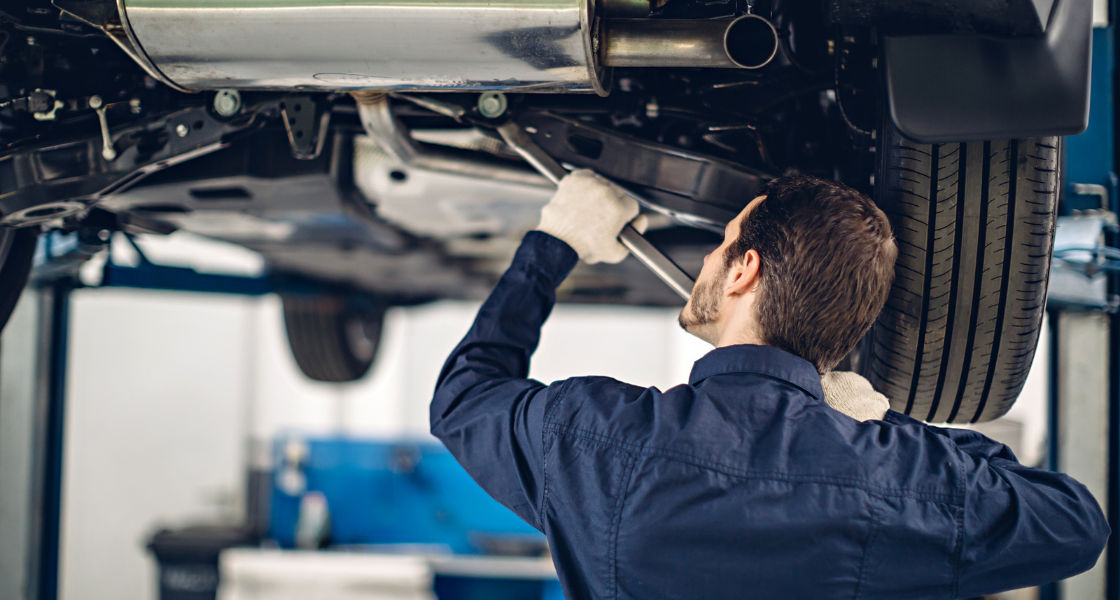Improving tire performance is often thought of in terms of pressure, tread retention, and traction. What may not immediately come to mind but plays just as significant a role is the car suspension system.
Beyond providing a smooth ride, well-maintained suspension systems play a pivotal role in ensuring even tire wear and longevity!
We’ll uncover the connection between car suspension and tire performance to see that the type of wear your tires experience may reveal underlying suspension issues.
What is the Role of a Vehicle Suspension System?
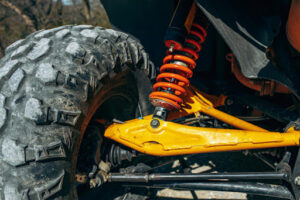
Car suspension systems are designed to give you as much control and comfort in your vehicle as possible.
Imagine driving down a road full of bumps, potholes, and uneven surfaces. Without a suspension system in your vehicle, every jolt and bump would be directly transferred to you and your passengers, making the ride incredibly uncomfortable.
The suspension system is like a cushion between the wheels and the car’s body. As a system, it has several components, including suspension springs, shock absorbers, joints, bearings, rods/links, and bushings. It helps absorb the shocks from the road, making the ride smoother and more enjoyable while improving your car’s handling, allowing you to turn corners and brake more easily. Car suspensions keep the tires firmly in contact with the road, which is critical for traction, control, and safety.
In short, the suspension system is what keeps your ride comfortable and your car stable as you drive over different types of roads.
How Does a Car Suspension System Impact Tire Wear?
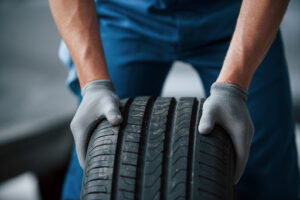
The suspension system of a car has a significant influence on how tires wear, especially when it comes to tire alignment.
Tire alignment refers to the precise angles at which the car tires are positioned relative to each other and the road surface. A properly aligned suspension system ensures that the tires make uniform and consistent contact with the road.
However, when components like shock absorbers wear out, the angles at which the tires meet the road can deviate from their intended positions. This misalignment causes some parts of the tires to bear more weight and friction than others during driving. Tires might wear out more rapidly on one side or specific areas, leading to irregular tread patterns.
The main signs of wear to look for are cupping, feathering, and bald spots. These three different types of uneven wear can tell you a lot about how your suspension system is functioning.
- Cupping occurs when the surface of the tire looks like it has been hollowed out to appear like hills and valleys. It is usually caused by wearing a shock absorber leading to excessive tire movement and inconsistent tread contact with the road.
- Feathering appears as tread ribs worn more on one side of the tire than the other, almost like the teeth of a saw. This uneven wear is most commonly caused by tire misalignment from a poorly functioning suspension.
- Bald spots on a tire are caused by misalignment from bad shocks and appear as excessively worn patches on the front of the tire’s tread.
What Role Does Tire Pressure Play in Reducing Wear and Tear?
Maintaining the appropriate tire pressure in your vehicle’s tires is a critical factor in reducing wear and tear.
Proper tire pressure ensures that the tire tread wears down evenly When tire pressure is too low, the tread edges tend to wear faster than the center. Conversely, overinflated tires can cause the center of the treads to wear out prematurely.
By keeping the right tire pressure, you ensure that the entire tread surface makes consistent contact with the road, distributing the forces evenly and preventing uneven wear patterns.
How Can Nitrogen-Filled Tires Help Mitigate Suspension-Related Tire Wear?
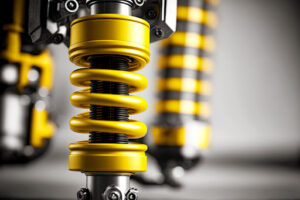
Suspension-related tear occurs mostly due to misalignment of the tires due to a worn-out suspension system.
Because it mainly lies on the suspension system, not the tire, whether nitrogen gas or regular air fills your tires won’t have a direct impact on the tire wear caused by suspension systems.
However, nitrogen filled tires are better at reducing wear and tear, contributing to a longer life expectancy than tires filled with regular air. In fact, tires filled with nitrogen have a 48% longer average life expectancy than air-filled tires.
So, even though they won’t directly reduce suspension related wear, nitrogen-filled tires are more durable than conventional tires.
Why are Nitrogen-Filled Tires More Resistant to Wear and Tear?
Nitrogen tires are more resistant to wear and tear because they maintain inflation pressure better than regular tires. This is due to nitrogen’s unique structure. Since nitrogen molecules are larger than oxygen molecules, they seep out of tires about 40% slower than regular air. This slower rate of air pressure loss keeps tire pressure at consistent levels over time, contributing to better tire performance and longevity.
How Often Should I Check My Car’s Suspension and Tires?
Regularly checking both your suspension system and tire wear is a proactive step that can significantly enhance your driving experience, safety, and long-term savings.
Your car’s suspension is the backbone of your vehicle, ensuring a smooth and comfortable ride. By inspecting and maintaining it regularly, you’re investing in a more enjoyable journey while safeguarding against potential handling issues.
Additionally, keeping a close eye on tire wear is equally essential. In particular, you should monitor your tread depth across all your tires. Well-maintained tires not only provide better traction and control but also contribute to improved fuel efficiency and longer tire life.
Both suspension and tire problems can be addressed early on, saving you from expensive repairs down the road. So, take a few moments to check your suspension system for any signs of wear and give your tires a thorough inspection. Your vehicle and your wallet will thank you with smoother rides, better handling, and fewer unexpected expenses!
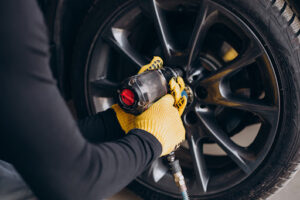
Enhance Your Car’s Performance With Nitrogen-Filled Tires!
At Fuel and Tire Saver, we offer a nitrogen tire inflation service as a cost-effective solution for optimizing tire performance!
Our team is committed to the science behind nitrogen tire inflation and can work with you to develop a customized tire maintenance plan that meets the unique needs of your fleet.
Contact Fuel and Tire Saver and check out our resources page to learn more about our nitrogen-filled tires and how we can help keep your fleet rolling smoothly!
References
- “Do Worn Shocks Affect Tyre Wear and Tear?” Supa Quick, www.supaquick.com/blog/do-worn-shocks-affect-tyre-wear-and-tear. Access date: 16 August 2023.
- “How Suspension Problems Cause Irregular Tire Wear.” Integra Tire, 14 Feb. 2022, www.integratire.com/suspension-tire-wear/. Access date: 16 August 2023.
- “Nitrogen Tires: Gimmick or Legit?” www.miamibugatti.com/blog/2022/july/28/nitrogen-tires-gimmick-or-legit.htm. Access date: 16 August 2023.
- “The Impacts of Suspension Maintenance.” Fleet Maintenance, www.fleetmaintenance.com/equipment/chassis-body-and-cab/article/21212340/the-impacts-of-suspension-and-tire-maintenance. Access date: 16 August 2023.

